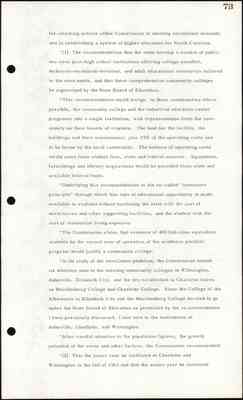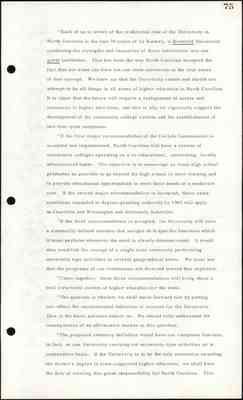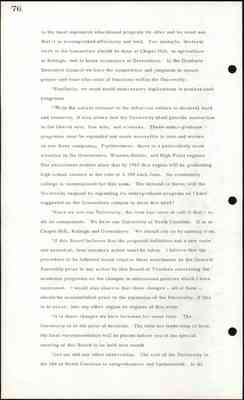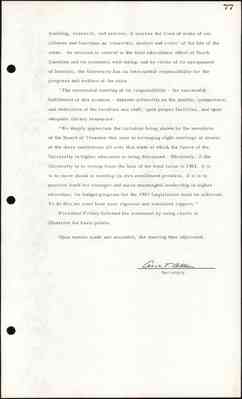Pages
73
far-reaching actions of this Commission in meeting enrollment demands and in establishing a system of higher education for North Carolina.
"(1) The recommendation that the state develop a system of public two-year post-high school institutions offering college-parallel, technical-vocational-terminal, and adult educational instruction tailored to the area needs, and that these comprehensive community colleges be supervised by the State Board of Education.
"This recommendation would merge, in those communities where possible, the community college and the industrial education center programs into a single institution, with representation from the community on their boards of trustees. The land for the facility, the buildings and their maintenance, plus 15% of the operating costs are to be borne by the local community. The balance of operating costs would come from student fees, state and federal sources. Equipment, furnishings and library acquisitions would be provided from state and available federal funds.
"Underlying this recommendation is the so-called "commuter principle" through which this type of educational opportunity is made available to students without burdening the state with the cost of dormitories and other supporting facilities, and the student with the cost of residential living expenses.
"The Commission states that evidence of 400 full-time equivalent students by the second year of operation of the academic parallel program would justify a community college.
"In its study of the enrollment problem, the Commission turned its attention next to the existing community colleges at Wilmington, Asheville, Elizabeth City, and the two established in Charlotte known as Mecklenburg College and Charlotte College. Since the College of the Albemarle in Elizabeth City and the Mecklenburg College decided to go under the State Board of Education as permitted by the recommendation I have previously discussed, I now turn to the institutions at Asheville, Charlotte, and Wilmington.
"After careful attention to the population figures, the growth potential of the areas and other factors, the Commission recommended:
"(2) That the junior year be instituted at Charlotte and Wilmington in the fall of 1963 and that the senior year be instituted
74
in the fall of 1964. This recommendation shall also apply to Asheville-Biltmore College when an enrollment of 7 00 full-time equivalent students is reached in the college parallel work.
"Here again the commuter plan was being observed. Although a clear case was made for the expanded academic program leading to the baccalaureate degree, graduate work is not contemplated nor is duplication of professional training foreseen. These institutions will become four-year co-educational, non-resident, liberal arts and sciences colleges with specialized programs to meet unique community needs.
"Mr. Pearsall has presented a report on the work of his Committee insofar as Charlotte, Asheville, and Wilmington and University status are concerned, and I shall not dwell on this aspect of his report.
"(3) This leads me then to the third major recommendation of the Commission: the proposed statutory definition of University function.
"It is as follows:
"'The University shall provide instruction in the liberal arts, fine arts, and sciences, and in the learned professions, including teaching, these being defined as those professions which rest upon advanced knowledge in the liberal arts and sciences; and shall be the primary state-supported agency for research in the liberal arts and sciences, pure and applied. The University shall provide instruction in the branches of learning relating to agriculture and the mechanic arts, and to other scientific and classical studies. The University shall be the only institution in the State system of higher education authorized to award the doctor's degree.'
"Note the choice of words here. The University shall be the 'primary' agency for research and the 'only institution' awarding the doctor's degree. If there is an identifiable need for such programs of graduate and professional work, for research, etc., in other areas of the state under this statute, the University will have the duty of providing it there.
"These discussions and many conferences have brought clearly into focus what, in my judgment, are matters of great significance for the University. These are matters to which the University administration and faculties have given much thought. If I may attempt to put it in a question, it would be this: In the fulfillment of its role of leadership in higher education in the state, what steps should the University now take to execute more effectively its mission and to lead the way in the pattern of change that is surely to come in higher education in North Carolina?
75
"Each of us is aware of the traditional role of the University in North Carolina in the last 30 years of its history, a threefold University combining the strengths and resources of three institutions into one great institution. This has been the way North Carolina accepted the fact that our state can have but one state university in the true sense of that concept. We know too that the University cannot and should not attempt to be all things in all areas of higher education in North Carolina. It is clear that the future will require a realignment of assets and resources in higher education, and this is why we vigorously support the development of the community college system and the establishment of new four-year compuses.
"If the first major recommendation of the Carlyle Commission is accepted and implemented, North Carolina will have a system of community colleges operating on a co-educational, commuting, locally administered basis. The objective is to encourage as many high school graduates as possible to go beyond the high school in their training and to provide educational opportunities to meet their needs at a moderate cost. If the second major recommendation is accepted, these same conditions expanded to degree-granting authority by 1965 will apply to Charlotte and Wilmington and ultimately Asheville.
"If the third recommendation is accepted, the University will have a statutorily defined mission that assigns to it specific functions which it must perform whenever the need is clearly demonstrated. It would also establish the concept of a single state university performing university type activities in several geographical areas. We must see that the programs of our institutions are directed toward this objective.
"Taken together, these three recommendations will bring about a well structured system of higher education for the state.
"The question is whether we shall move forward now by putting into effect the recommended definition of mission for the University. This is the basic question before us. We should fully understand the consequences of an affirmative answer to this question.
"The proposed statutory definition would have our campuses function, in fact, as one University carrying out university-type activities on a cooperative basis. If the University is to be the only institution awarding the doctor's degree in state-supported higher education, we shall have the duty of meeting this great responsibility for North Carolina. This
76
is the most expensive educational program we offer and we must see that it is accomplished efficiently and well. For example, doctoral work in the humanities should be done at Chapel Hill, in agriculture at Raleigh, and in home economics at Greensboro. In the Graduate Executive Council we have the competence and judgment to insure proper and wise allocation of functions within the University.
"Similarly, we must avoid unnecessary duplications in professional programs.
"While the salient element in the definition relates to doctoral work and research, it also states that the University shall provide instruction in the liberal arts, fine arts, and sciences. These under-graduate programs must be expanded and made accessible to men and women on our three campuses. Furthermore, there is a particularly acute situation in the Greensboro, Winston-Salem, and High Point regions. Our enrollment studies show that by 1965 this region will be graduating high school seniors at the rate of 3, 500 each June. No community college is contemplated for this area. The demand is there; will the University respond by expanding its undergraduate program as I have suggested on the Greensboro campus to meet this need?
"Since we are one University, the time has come to call it that - in all its components. We have one University of North Carolina. It is at Chapel Hill, Raleigh and Greensboro. We should say so by naming it so.
"If this Board believes that the proposed definition and a new name are essential, then statutory action must be taken. I believe that the procedure to be followed would require these enactments by the General Assembly prior to any action by this Board of Trustees concerning the academic programs or the changes in admissions policies which I have mentioned. I would also observe that these changes - all of them - should be accomplished prior to the expansion of the University, if this is to occur, into any other region or regions of this state.
"It is these changes we have foreseen for some time. The University is at the point of decision. The time for leadership is here. My final recommendation will be placed before you at the special meeting of this Board to be held next month.
"Let me add one other observation. The role of the University in the life of North Carolina is comprehensive and fundamental. In its
77
teaching, research, and service, it touches the lives of many of our citizens and functions as 'observer, analyst and critic' of the life of the state. Its mission is central to the total educational effort of North Carolina and its economic well-being; and by virtue of its assignment of function, the University has an inescapable responsibility for the progress and welfare of the state.
"The successful meeting of its responsibility - the successful fulfillment of this purpose - depends primarily on the quality, competence, and dedication of the faculties and staff, upon proper facilities, and upon adequate library resources.
"We deeply appreciate the initiative being shown by the members of the Board of Trustees this year in arranging eight meetings of alumni of the three institutions all over this state at which the future of the University in higher education is being discussed. Obviously, if the University is to recoup from the loss of the bond issue in 1961, if it is to move ahead in meeting its own enrollment problem, if it is to position itself for stronger and more meaningful leadership in higher education, its budget program for the 1963 Legislature must be achieved. To do this we must have your vigorous and sustained support."
President Friday followed his statement by using charts to illustrate the basic points.
Upon motion made and seconded, the meeting then adjourned.
[signature] Secretary




